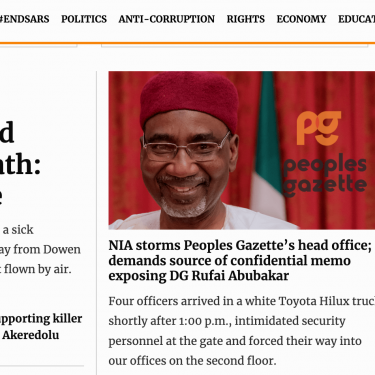Nigerian intelligence agency raids news website

Reporters Without Borders (RSF) is appalled by a Nigerian intelligence agency’s harassment of an Abuja-based news website with the aim of identifying its source for a leaked memo questioning the head of the agency’s qualifications for the job.
Is the director general of the National Intelligence Agency (NIA), Nigeria’s foreign intelligence service, trying to eliminate this respected investigative news outlet in order to save his skin?
Four NIA officials stormed into the headquarters of the Peoples Gazette news website yesterday demanding to see the managing editor and a reporter in order to identify the source of a confidential memo that was the subject of several articles published by the site in December. Neither the managing editor nor the reporter were there when the raid took place.
The leaked memo to Nigerian President Muhammadu Buhari from unidentified NIA directors claimed that the NIA’s the current director general, Ahmed Rufai Abubakar, was compulsorily retired from the agency in 2012 after failing examinations for promotion from the position of deputy director to director three times in a row. The four NIA officials handed a letter to the journalists present criticising Peoples Gazette for failing to contact the agency to verify the memo’s authenticity and threatening to use “other options” if the website did not hand over its copy of the memo and identify those who wrote it. In a response published on the site, Peoples Gazette said it did not doubt the memo’s authenticity and reported that President Buhari’s spokesman had confirmed to the website that the president had received the memo.
“We strongly condemn the pressure being placed on this media outlet, which violates the most basic rights of journalists,” said Arnaud Froger, the head of RSF’s Africa desk. “For an intelligence agency to conduct a raid on a news organisation in order to identify a source with the sole aim of protecting its own interests is extremely dangerous. We call on the authorities to end their harassment of this site, which is constantly subjected to pressure and threats because of the quality of its reporting and the serious subjects it addresses.”
The authorities have deliberately blocked online access to the Peoples Gazette site since January 2021, a few months after its launch and its first exposés, which included revealing that the son of the president’s chief of staff had been given access to privileges and responsibilities despite holding no official position.
The situation of journalists and media have worsened steadily in recent years in Nigeria, which is now by far the most repressive and most dangerous country for reporters in West Africa. Three reporters have been killed during protests or large gatherings since 2019, and many others have been attacked or arrested during protests. These violations have gone completely unpunished, with the result that journalists censor themselves and some have fled abroad.
Nigeria is ranked 120th out of 180 countries in RSF's 2021 World Press Freedom Index.



